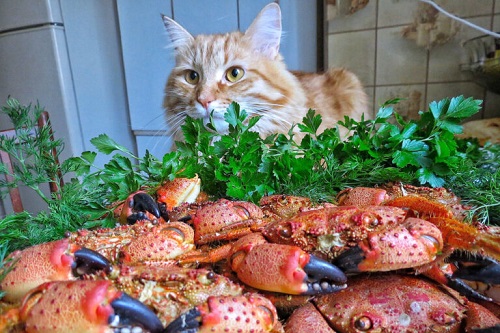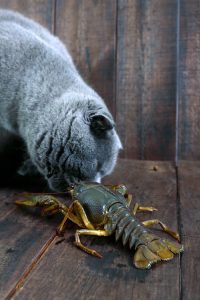Can Cats Eat Crab? Read this informative article to find out more information about the combination of cats and crabs!
With the rise in popularity of seafood as a healthy protein source, you may be wondering if your feline companion can enjoy the taste of crab. In this article, we will explore the question, “Can Cats Eat Crab?” and discuss the potential benefits and risks of feeding this delicious crustacean to your feline friend.
Can Cats Eat Raw Shrimp? Find out here
What Is Crab?

A crab is a type of crustacean that lives in saltwater or freshwater environments. It has a hard exoskeleton, ten legs, and two claws that it uses for catching food and defending itself. There are many different species of crabs, and they are commonly used as a food source in many cultures around the world. Crab meat is considered a delicacy and is widely used in a variety of dishes, such as salads, sandwiches, and sushi.
Can Cats Eat Crab?
Yes, cats can eat crab, but it should be given to them in moderation and prepared properly. Crab meat is a good source of nutrition, which can be beneficial for your kitty’s health. However, it is important to note that some cats may have an allergic reaction to crab, so it is essential to introduce it slowly.
Is Crab Toxic For Cats?
Crab is not toxic for cats but can cause digestive issues if not prepared properly or given in excess. As mentioned earlier, some cats may be allergic to crab, so it is essential to introduce it slowly. Additionally, crabs can be contaminated with harmful bacteria, which can cause food poisoning in cats. It is important to take precautions to ensure that your pet can safely enjoy this tasty treat.
Does Crab Contain Any Nutritional Value For Cats?

- Proteins: Crab meat is a good source of protein, which is essential for maintaining your cat’s muscle mass and supporting its overall health.
- Fatty acids: It contains omega-3 fatty acids, which can help support cardiovascular and immune system health along with promoting healthy skin and a shiny coat.
- Vitamins and Minerals: Crab meat also contains essential vitamins and minerals (support bone health and proper thyroid function in cats) such as selenium (an antioxidant that can help to protect your cat’s cells from damage), zinc (important for wound healing and maintaining a healthy immune system), and vitamin B12 (essential for the production of red blood cells and can support your cat’s nervous system function), which can help your cat’s metabolism and overall well-being.
- Low in fat and calories: Crab meat is a low-fat and low-calorie protein source, which can be beneficial for cats who need to manage their weight.
How To Feed Crab To Cats
- Make sure that the crab is fresh and has not been sitting in the refrigerator for an extended period of time.
- Ensure that the crab is cooked thoroughly and sourced from a reputable supplier to reduce the risk of bacterial contamination.
- Remove the shells and any seasoning, like salt, garlic, or other spices, before feeding the crab meat to your cat.
- Consider adding a small amount of crab meat to your cat’s regular food as a treat or supplement.
- Always introduce crab to your cat’s diet slowly, starting with a small amount and watching for any signs of an adverse reaction.
- Finally, if you notice any signs of an adverse reaction after feeding your cat crab, such as vomiting, diarrhea, or difficulty breathing, contact your veterinarian right away.
Risks Of Feeding Crab To Cats

- Some cats may be allergic to shellfish, including crab, which can cause symptoms such as vomiting, diarrhea, or difficulty breathing.
- Crabs can be contaminated with harmful bacteria such as Vibrio and Salmonella, which can cause food poisoning.
- The shells of crabs can be a choking hazard for cats.
- A crab that has been seasoned with salt, garlic, or other spices can be harmful to your cat’s health.
- Feeding too much crab to cats can upset their digestive system and lead to diarrhea or vomiting.
Can Cats Eat Crab? Quick Takeaways!
- Cats can eat crab, but it should be given in moderation.
- Crab meat is a good source of protein, fatty acids, vitamins, and minerals.
- Crab is not toxic for cats but can cause digestive issues if not prepared properly or given in excess.
- When feeding crab to cats, it is essential to ensure that it is fresh, cooked thoroughly and that the shells and seasoning are removed.
- Risks of feeding crabs to cats include allergies, bacterial contamination, choking hazards, and digestive issues.
- If a cat shows signs of a negative reaction to crab, contact a veterinarian immediately.



